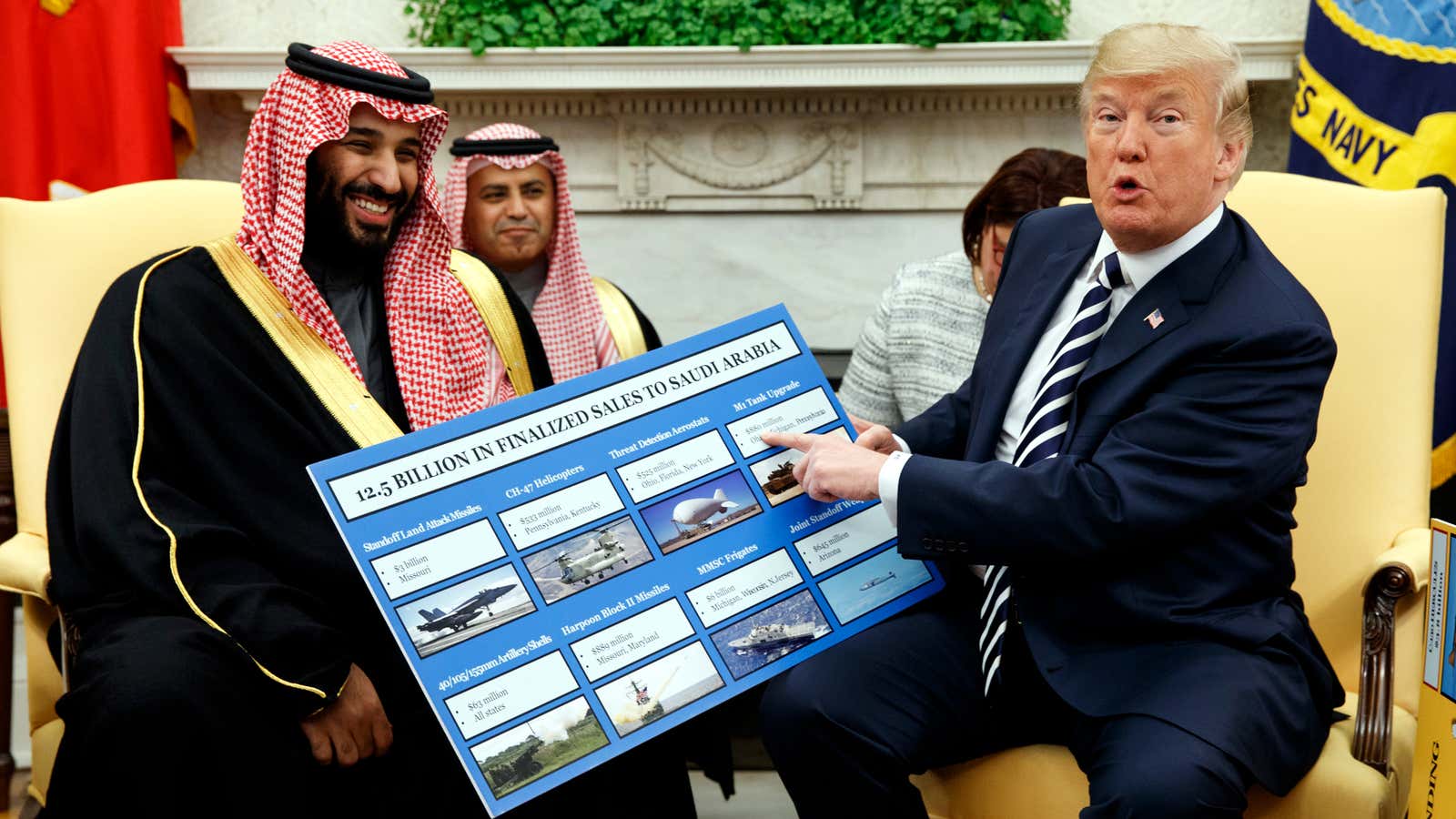Donald Trump explained succinctly last week why he won’t do much about the apparent murder of a US permanent resident by the Saudi Arabian government.
“We don’t like it even a little bit. But as to whether or not we should stop $110 billion from being spent in this country, knowing they have four or five alternatives, two very good alternatives, that would not be acceptable to me,” Trump explained while sitting in the Oval Office.
The president was referring (inaccurately) to weapons being sold by US defense contractors to the Saudi government. The $110-billion commitment was announced at famously orb-y gathering last year; so far, only $14.5 billion in sales have been realized.
Now, a group of senators have called on the president to investigate the death of journalist Jamal Khashoggi under a law that would apply economic sanctions to Saudi Arabia if it was found responsible. Khashoggi, a journalist and critic of the Saudi regime under King Salman and his influential son, crown prince Muhammed bin Salman, was reportedly killed and dismembered in a Saudi consulate in Turkey.
Trump, however, is more interested in maintaining the lucrative flow of weapons sales, which nearly doubled after he took office. Between 2008 and 2017, the US sold $10.6 billion in weapons to Saudi Arabia, a little more than half of the kingdom’s military hardware purchases in that time. That represents 12% of US foreign arms sales during a period when it was the world’s largest supplier of arms.
Supporting Saudi Arabia has been a longtime foreign policy priority for the US. And weapons sales began to increase after the kingdom began to intervene in Yemen’s civil war. US policymakers see the brutal conflict as a proxy battle between Iran and Saudi Arabia for regional influence.
Hundreds of civilian deaths connected to weapons supplied by the US already had lawmakers demanding stricter oversight. It took the death of Khashoggi, a well-known Saudi expatriate based in Washington, DC, to bring the situation to a head.
What kind of weapons are we talking about, exactly? In 2017 alone, the US confirmed deals to sell 618 guided bombs, 24 Apache attack helicopters, 70 Blackhawk transport helicopters, 48 Chinook transport helicopters, four naval frigates, spare engines for fighter aircraft, six surveillance aircraft, and over 100 surface-to-air missiles, according to deals tracked by the Stockholm International Peace Research Institute.
Their manufacturers have not been hesitant in sharing this largesse with politicians. Raytheon and its employees, which make those bombs, have given $2.4 million to US politicians in this election cycle. Boeing and its team, the lead contractor for Apache and Chinook helicopters, donated $3.2 million. Lockheed Martin and its employees, which make the Blackhawk, gave $3.7 million. All three companies also spend millions lobbying policymakers directly.
Many of the deals negotiated with Saudi Arabia under the Trump administration hinge on the personal relationship between Jared Kushner and MBS, as the crown prince is known. The extent of Trump’s personal interests in Saudi Arabia remain unknown, since the president has refused to publicly disclose his tax filings. Five of Trump’s personal aides have pleaded guilty or been convicted of financial crimes, often involving foreign actors, and Trump himself has been implicated in felony campaign finance crime.
Saudi Arabia has already seen the increasingly authoritarian consequences of MBS’ influence, including the kidnapping of Lebanon’s prime minister and a shakedown of the ruling elite that was much-praised by Thomas Friedman. Now, voices are calling for a re-think of the US relationship with Saudi Arabia, an increasingly byzantine arrangement linking American imperial ambitions in the Middle East to the personal ambitions of a figure already being compared to Saddam Hussein. Hussein himself was a frequent recipient of US arms in the 1980s.
Trump’s openly stated decision to make foreign policy based on the needs of weapons-makers stands squarely opposed to president Dwight Eisenhower’s famous advice that “in the councils of government, we must guard against the acquisition of unwarranted influence, whether sought or unsought, by the military-industrial complex.”
